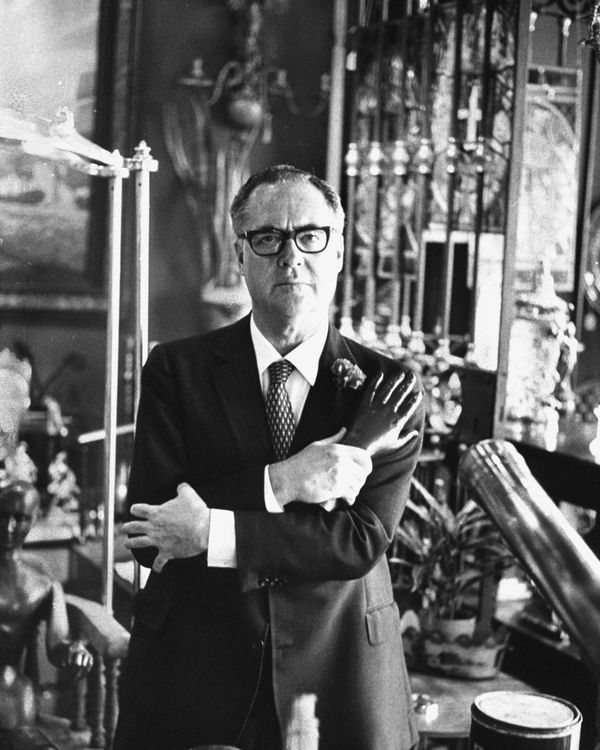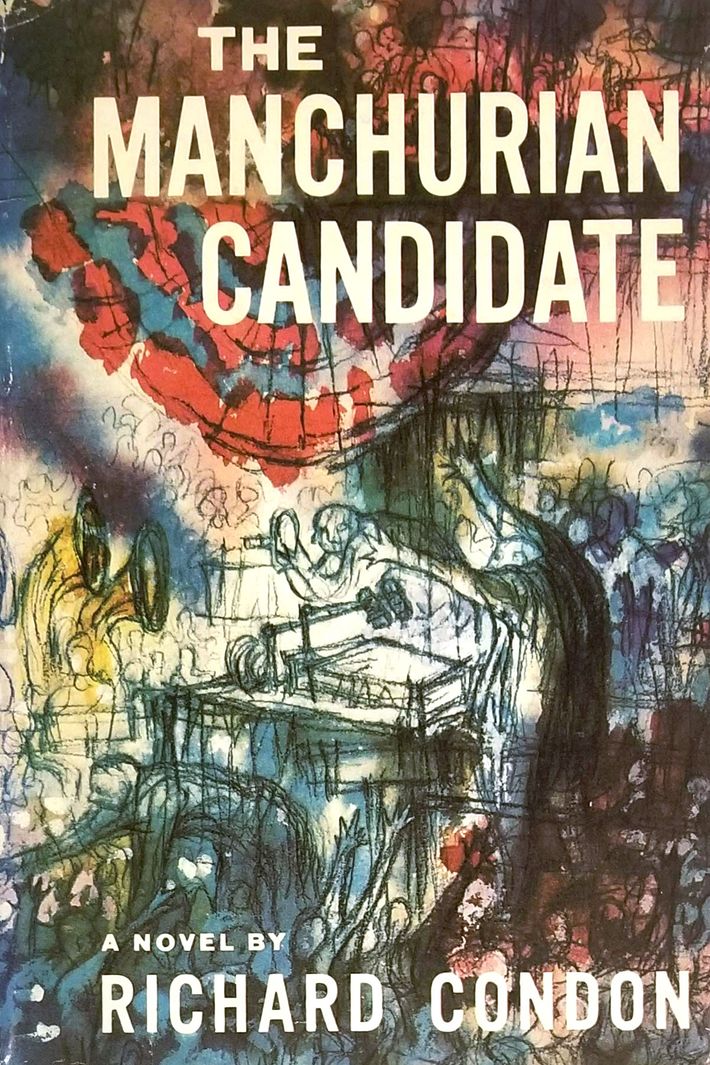
Before it plunges us into its uniquely satirical hellscape, Richard CondonÔÇÖs novel The Manchurian Candidate teases with an upbeat opening sentence: ÔÇ£It was sunny in San Francisco; a fabulous condition.ÔÇØ After which we delve into the tale of a brainwashed Korean War veteran named Raymond Shaw, who is surrounded by power-mad politicians and duplicitous foreign agents and tasked by his own unscrupulous mother to carry out an epic political assassination.
Sixty years ago, in April 1959, CondonÔÇÖs second novel was loosed into a world beset by McCarthyism and Cold War paranoia. It was not exactly greeted as highbrow literature, but the reviews were generally good; Time put it on its list of Ten Best Bad Novels. It sold well enough, and its profile grew in the wake of John FrankenheimerÔÇÖs 1962 film adaptation, which itself took roughly 25 years to find a lasting audience, perhaps having something to do with the assassination of JFK. In the years since, the story has undergone the occasional reboot: John LahrÔÇÖs 1994 stage play, Jonathan DemmeÔÇÖs anodyne 2004 Gulf WarÔÇôera remake, even a 2015 operatic adaptation. But over time, CondonÔÇÖs novel has taken a back seat to FrankenheimerÔÇÖs film and been largely relegated to the shelves of used bookstores like the one I wandered into on a rainy afternoon in San Francisco earlier this year.
I bought the book mostly as a curiosity. The title, The Manchurian Candidate, invoked since TrumpÔÇÖs election by columnists and cable-news jesters of both left and right, had been echoing like an air-raid siren in my head for more than two years during the buildup to the Mueller report. I was expecting to encounter a dated pulp novel larded with camp, and I wasnÔÇÖt entirely wrong. But what I also discovered in those pages ÔÇö and in CondonÔÇÖs worldview ÔÇö was something that, while originally targeted at the barbarities of McCarthyism, felt like a pitch-perfect anticipation of our current national mood.
It took some time to adjust to CondonÔÇÖs prose; it is, as Louis Menand wrote in a 2003 New Yorker appraisal, a deeply strange book with wildly shifting tones, odd word choices, and often baffling metaphors (some of that may have been by design; one blogger found that Condon appeared to have cribbed certain phrases from Robert GravesÔÇÖs I, Claudius). The Times, in its initial review, called it ÔÇ£a wild, vigorous, curiously readable melange.ÔÇØ But the further I got into it, the more I began to think that Condon, in his messy way, had tapped into something bigger.
This was not just a book that presaged the Zeitgeist because it was about an enemy manipulating our political system ÔÇö though that part, particularly early scenes that feature a Chinese psychiatrist demonstrating his brainwashing techniques on Shaw, did feel weirdly resonant. What struck me more was how, six decades ago, CondonÔÇÖs style adumbrated the creeping sense of absurdity that so many of us cope with on a daily basis: that feeling you have when you wake up every morning and you think, How indescribably idiotic is the world going to get today? ThatÔÇÖs the space Condon inhabits; it was the driving force behind his over-the-top writing.
Consider this simile from The Manchurian Candidate describing what it feels like to be the subject of a British tabloid report: It was ÔÇ£not unlike falling nude into a morass of itching powder while two sadistic dentists drilled into oneÔÇÖs teeth at the instant of apogee of alcoholic historyÔÇÖs most profligate hang-over.ÔÇØ ThatÔÇÖs a ridiculously overwritten sentence; just to retype it makes me feel like IÔÇÖm going to get scolded by an MFA professor. But we live in a moment where no metaphor or form of satire is big enough to contain whatÔÇÖs actually happening. The antic use of ten-dollar words here feels somehow apposite.
All that wild language was a reflection of CondonÔÇÖs central belief: that the world has always been batshit-crazy and inherently corrupt. ÔÇ£He really felt there were conspiracies at work all the time,ÔÇØ his daughter, Wendy Jackson, tells me. ÔÇ£To him, it was a prevalent feature of our society.ÔÇØ
Where CondonÔÇÖs relentlessly cynical view of America came from is not entirely clear; while he saw sinister plots everywhere, he was anything but a sinister person, says his daughter. But there are hints in old interviews about the roots of his disillusionment. A difficult childhood in early-20th-century New York City and an overbearing father left him with an occasional stutter; a nearly two-decade career as a Hollywood press agent made him entirely disdainful of both movie stars and the people who worshipped them. In dealing with moguls like Cecil B. DeMille and Howard Hughes, he grew increasingly skeptical of AmericaÔÇÖs obsession with wealth and power. At one point, a co-worker at RKO Pictures showed him the machine Hughes used to listen in on his employeesÔÇÖ telephone calls.
ÔÇ£After 22 years of lifting actors and producers off bored whores at Polly AdlerÔÇÖs, bribing the press and doing the 50 other useless things that are a part of that work, you do tend to get a little anti-authoritarian,ÔÇØ Condon told one interviewer. ÔÇ£You lose respect for public judgment because you know you can sell them anything. An-y-thing!ÔÇØ
Virtually every major character in The Manchurian Candidate ÔÇö and, as far as I can tell, every character in CondonÔÇÖs oeuvre ÔÇö is an obsessive misanthrope, including Raymond Shaw, who resents nearly everyone around him. As for the rest of the cast, some, like ShawÔÇÖs heroin-addicted mother, Eleanor, are Machiavellian; others, like ShawÔÇÖs McCarthyite stepfather, Senator John Iselin, are mere useful idiots. Sometimes itÔÇÖs hard to tell the difference between those who are doing the conditioning and those who are being conditioned. People plot, scheme, and give long and windy backroom soliloquies about returning America to its ÔÇ£original purity.ÔÇØ ThereÔÇÖs a running joke in the book (and also in the movie) about how Senator Iselin repeatedly alters the number of communists he purports to have found in the Defense Department because heÔÇÖs too simpleminded to remember. (Iselin is obviously modeled on Joseph McCarthy, but heÔÇÖs essentially a proxy for every made-for-TV politician whoÔÇÖs emerged in the years since.) Eleanor finally tells him to settle on 57, because it ÔÇ£could be linked so easily with the fifty-seven varieties of canned food that had been advertised so well and so steadily for so many years.ÔÇØ
All of which coheres into something more than just a book about a politician compromised by foreign influence; it is a book about a compromised country. In The Manchurian CandidateÔÇÖs dystopia, all of our institutions are broken. Every societal check or balance is manipulated by the people at the top, and the masses are either too distracted or too complacent to care. But even as the media ÔÇö including Raymond himself, who ascends to a job as a political columnist after being brainwashed into murdering his predecessor ÔÇö bellows out warnings, no one cares. ÔÇ£The Republic was a humbug, the electorate rabble,ÔÇØ Condon writes in the voice of Eleanor (who was reportedly based on lawyer Roy Cohn, the direct link between McCarthy and Donald Trump), ÔÇ£and anyone strong who knew how to maneuver could have all the power and glory that the richest and most naive democracy in the world could bestow.ÔÇØ
Condon published more than two dozen books over the course of his career, including a series of novels about a hit man named Prizzi, one of which John Huston adapted into PrizziÔÇÖs Honor, the 1985 film that won HustonÔÇÖs daughter Angelica the Academy Award for Best Supporting Actress. He also wrote ambitious historical works. But itÔÇÖs the political stories that offer the most intense distillation of his worldview. TheyÔÇÖre ridiculous and theyÔÇÖre fun in their relentless mistrust of institutions and their outrage at the ways in which weÔÇÖve been brainwashed by those with the means and the power to do so. In 1974ÔÇÖs Winter Kills, a rollicking, strange JFK-assassination conspiracy novel ÔÇö later made into a 1979 William RichertÔÇôdirected black comedy ÔÇö a rich patriarch boasts about how owning hospitals is the ultimate business opportunity: ÔÇ£No credit for the customers, and they pay in advance or out on their ass.ÔÇØ
Condon once described his depictions of America as deliberately ÔÇ£baroqueÔÇØ and ÔÇ£grotesque,ÔÇØ but his imagined conversations between power brokers behind closed doors are the routine discourse of the Trump era. Such is the moment we live in.


